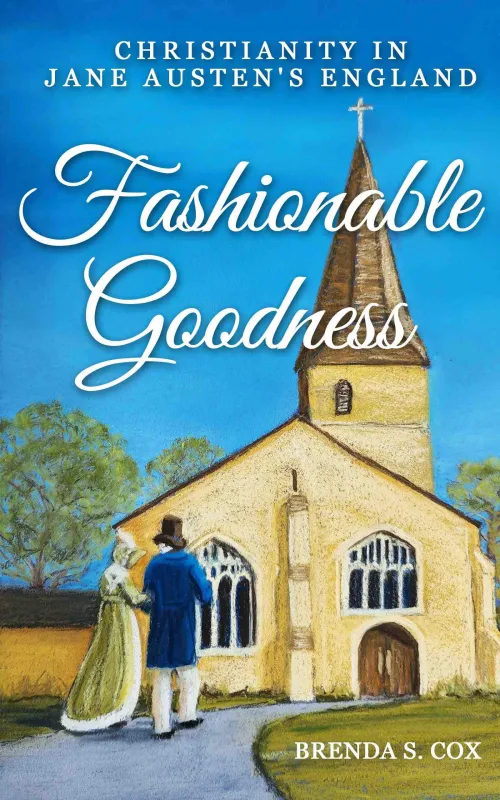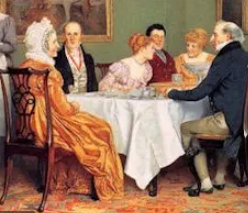A single man of large fortune; four or five thousand a year. What a fine thing for our girls! – Mrs. Bennet on Mr. Bingley’s income, Pride and Prejudice, Volume One, Chapter One
One of the hardest concepts for today’s readers to grasp in Jane Austen’s novels are the economic realities of the times. What do her numbers mean in modern terms? What was the standard of living during the regency era? When Olivia Williams as Jane Austen blurted to her brother Henry in Miss Austen Regrets, “Sense and Sensibility has brought me £140. May I not be proud of that?” – how can we translate that sentence so that it would hold some meaning for us?
A currency converter provided by the National Archives in the U.K. provides a rough idea of what these 1810 figures mean. Further clarification from experts will round out our understanding. Please keep in mind that the sums in the third column of the chart are merely approximations. At this precise time U.S. citizens should multiply these figures by two to derive a dollar amount. I am not an expert, and I will leave more detailed explanations to economists like Brad de Long.
To put some of these sums into perspective, the average annual income for an English laborer or farmer in 1800 was around 15-20 pounds. To live comfortably, an English gentleman like Mr. Bennet, would require around 300 pounds per year per individual, or over fifteen times the amount for a working man who supported his family. As you can see from the figures, as long as Mr. Bennet lived, his family was comfortably off. But the situation would change drastically the moment he died. After that unhappy event, Mrs. Bennet would be expected to live off the 4% interest of her £5,000 marriage settlement, or £200 per year. No wonder she became shrill every time she thought of her unmarried daughters, for Mr. Bennet’s entire yearly £2,000 income and his house were entailed to Mr. Collins. After Mrs. Bennet’s death, Lizzy would receive just 1/5 of her mother’s marriage portion, and she would bring to her marriage only 40 pounds per year.
Today it is hard to accurately determine the spending power of these sums (see the different estimates of Mr. Bingley’s income in the example below). Factors that influence spending power are war, inflation, cost of goods, housing and the geographic area in which the dwellings were located. In any event, Mr. Darcy’s and Mr. Bingley’s incomes would still be regarded as exceedingly fine. In fact, Mr. Darcy’s 10,000 per year represents only 4% interest of his vast fortune. And Mr. Bingley, though he receives only 4,000 per year, inherited almost 3.4 million pounds from his tradesman father in today’s terms.
“…the income would normally come from agricultural profits on land or from other property and investments (in Bingley’s case it turns out the be the latter). It is not easy to translate incomes of the time into today’s money. By some calculations, the effects of inflation mean that a pound in Jane Austen’s time has the same value as almost forty pounds today; if so, Bingley’s income would be the equivalent of 150,000 to 200,000 a year in today’s pounds (or around $250,000-$300,000 in current U.S. money). Altered economic condition, however, make estimates like this tricky: for example, goods tended to be much dearer at that time, in relative terms, while labor tended to be much cheaper. In addition, average incomes in this period, even when adjusted for inflation, were much lower than today, so Bingley’s income represents a far sharper deviation from the prevailing norm than its current equivalent would be.” – Shapard, Annotated Pride and Prejudice, P 5
One can now understand why in Sense and Sensibility Mrs. Dashwood and her daughters were forced to economize. When John Dashwood, under his wife’s influence, reneged on his promise to his dying father to contribute substantial sums of money to his step family, the women were forced to live on 500 pounds per year. This paltry sum would have barely covered their living expenses had it not been for Sir John Middleton’s generosity in inviting his cousin to live in a cottage on his estate.
Like the Dashwood women, Jane Austen, her mother, and sister also experienced chronic money worry. However, through the sale of her books Jane was able to earn a much needed supplemental income. While the £140 she earned from the sales of Sense and Sensibility does not sound like much, it represents close to $9,800 in today’s U.S. sums. In fact, the proceeds from the sale of her four books netted her over 23,000 pounds or around 46,000 dollars towards the end of her life. After her brother Henry’s financial reversals, this money must have been a welcome boon indeed.
Now that you’ve gained some understanding of what these sums of money mean, please read the following statement made by Mrs. Bennet in Volume 3 of Pride and Prejudice, Chapter 17:
Dear, dear Lizzy. A house in town! Every thing that is charming! Three daughters married! Ten thousand a year! Oh, Lord! What will become of me. I shall go distracted.
How much does ten thousand a year in 1810 represent?
a) £339, 600
b) $680,000
c) A princely sum
d) In relative terms, all of the above
Georgianna Darcy’s marriage portion is 30,000. How much annual income would this sum derive?
a) £3,000
b) £12,000
c) £1,200
d) £120
Sources and resources:
- Update: How Wealthy is Mr. Darcy Really? Pounds and Dollars in the World of Pride and Prejudice, James Heldman, JASNA
- Read my other post on the topic: In Jane Austen’s Own Words: Economic Sense and Sensibility
- Jane Austen Economics, 20 p. PDF document
- Crowns, Pounds and Guineas: A Quick Guide To British Currency: by Ellen Micheletti
- Understanding the Society in Which Jane Austen Sets Pride and Prejudice, Pamela Whalan, JASNA, 2002
- The people in Jane Austen’s life: The quintessential Georgian parents: George & Cassandra Austen, Michael Griffin, JASA, 2007
- Shapard, David M., The Annotated Pride and Prejudice, Jane Austen, Anchor Books, 2004
*References, Acknowledgements, Links, and Abbreviations, For the Male Voices Web Site
**Literary Study Tour: Jane Austen, 1998
***Ian Littlewood, Jane Austen: A Critical Assessment, p 205, 1998
Addendum:
To learn more about the ‘Cost of Living in Jane Austen’s England: Vulgar Economy’, click here . This article from the Jane Austen Centre goes into further detail about the Mrs. and Misses Dashwoods’ economic situation.










